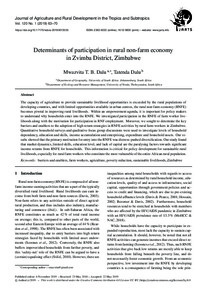| dc.date.accessioned | 2019-11-08T10:04:49Z | |
| dc.date.available | 2019-11-08T10:04:49Z | |
| dc.date.issued | 2019-11-06 | |
| dc.identifier | doi:10.17170/kobra-20190613555 | |
| dc.identifier.uri | http://hdl.handle.net/123456789/11341 | |
| dc.description | Gedruckte Ausg. im Verlag Kassel Univ. Press (www.upress.uni-kassel.de) erschienen. | ger |
| dc.language.iso | eng | eng |
| dc.rights | Urheberrechtlich geschützt | |
| dc.rights.uri | https://rightsstatements.org/page/InC/1.0/ | |
| dc.subject | barriers and enablers | eng |
| dc.subject | farm workers | eng |
| dc.subject | agriculture | eng |
| dc.subject | poverty reduction | eng |
| dc.subject | sustainable livelihoods | eng |
| dc.subject | Zimbabwe | eng |
| dc.subject.ddc | 630 | |
| dc.title | Determinants of participation in rural non-farm economy in Zvimba District, Zimbabwe | eng |
| dc.type | Aufsatz | |
| dcterms.abstract | The capacity of agriculture to provide sustainable livelihood opportunities is exceeded by the rural populations of developing countries, and with limited opportunities available in urban centres, the rural non-farm economy (RNFE) becomes pivotal in improving rural livelihoods. Within an empowerment agenda, it is important for policy makers to understand why households enter into the RNFE. We investigated participation in the RNFE of farm worker livelihoods along with the motivation for participation in RNF employment. Moreover, we sought to determine the key barriers and enablers to the adoption of high return strategies in RNFE activities by rural farm workers in Zimbabwe. Quantitative household surveys and qualitative focus group discussions were used to investigate levels of household dependency, education and skills, income accumulation and enterprising, expenditure and household assets. Our results showed that the primary motivation for entry into the RNFE was distress-pushed diversification. Our study found that market dynamics, limited skills, education level, and lack of capital are the paralysing factors towards significant income returns from RNFE for households. This information is critical for policy development for sustainable rural livelihoods, especially for rural farm workers who constitute the most vulnerable of the entire African rural population. | eng |
| dcterms.accessRights | open access | |
| dcterms.creator | Dalu, Mwazvita T. B. | |
| dcterms.creator | Dalu, Tatenda | |
| dc.type.version | publishedVersion | |
| dcterms.source.identifier | ISSN 2363-6033 | |
| dcterms.source.issue | No. 1 | |
| dcterms.source.journal | Journal of Agriculture and Rural Development in the Tropics and Subtropics (JARTS) | eng |
| dcterms.source.pageinfo | 63-70 | |
| dcterms.source.volume | Vol. 120 | |

